| Homepage |
| New books |
| News in Brief |
| list of late magazines |
| Articles Recommended |
"Forced assimilation of 1 million Tibetan children"? Foreign special observer has an exclusive visit to a boarding school in Tibet
On February 2023, three "Special Rapporteurs on minority issues" who serve the United Nations in their personal capacity issued a report in their personal capacity, claiming that China had “culturally, religiously and linguistically assimilated the Tibetan people through boarding schools, affecting approximately one million Tibetan children. " Some Western media outlets have retweeted the report criticizing boarding schools in China's Tibet Autonomous Region.

Are Tibetan children forced to attend boarding schools? Do children face "assimilation education" in the classroom? What are the real conditions of school accommodation?
In order to investigate the questions raised by the Western media, foreign special observer Angela went to Lhasa, Tibet, to investigate the facts.
Question 1. Are Tibetan students "assimilated"?
Lhasa-Nagqu No. 1 Senior High School, founded in 2004, is the first branch school of Nagqu City in Lhasa.
The school currently has 3 grades and 43 classes with a total of 2345 students, and is a boarding high school. Angela arrived at a high school class where the students had just finished a Tibetan lesson.

Lhasa-Nagqu No. 1 Senior High School now has 27 Tibetan teachers teaching in the school.
Pasang Tsering, the Tibetan teacher, told Angela that the children here began to learn Tibetan from an early age, mainly learning words and sentences in primary school, starting to learn grammar after junior high school, and focusing on tenses in high school. In this way, the Tibetan language is learned at different ages and at different levels.

Angela: There has been a saying in the reports of the Western media that in addition to Tibetan, there is also Chinese and English to be learned here, which means that there is a need to "assimilate", and the Tibetan language is completely placed in a weakened or downplayed position. What do you think?
Pasang Tsering: If it is weakened, in fact, the most direct key is that the college entrance examination can cancel Tibetan, you can put the score less, but from the past to the present, the Tibetan exam has always been 150 points.
For such a long time, the content of Tibetan class has been inheriting its own national culture, and even when our school schedules classes, or when the results are presented, Tibetan is put in the first place. This cannot be downplayed, and it has always been attached great importance.
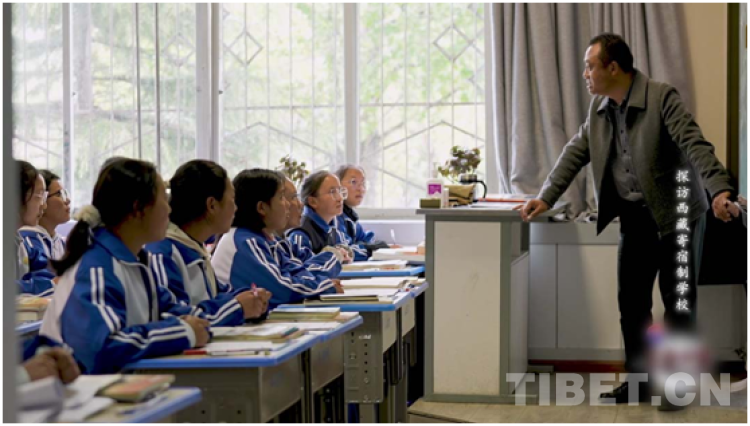
Angela: The UN report also says that the language the students use here is Mandarin, and then the students can't speak Tibetan with their families at all?
Pasang Tsering: Primary school students, junior high school students have been taking Tibetan classes, how can there be problems in communicating with the Tibetan language at home? Absolutely impossible. If there is a problem, then part of my Tibetan class will have to take out other languages to translate it.
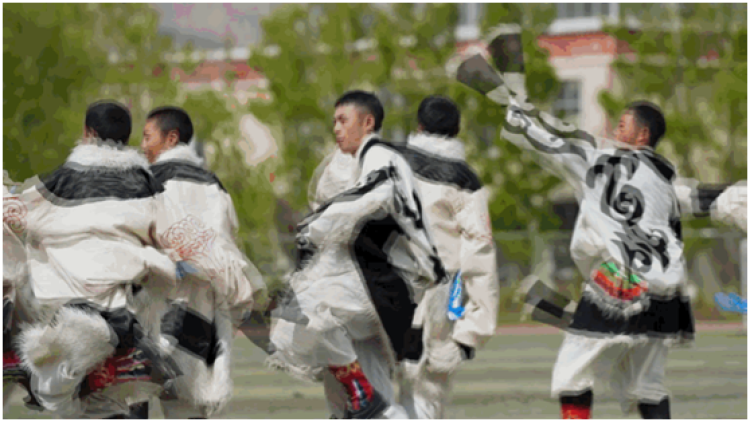
Class is over and the school children are choreographing a Tibetan dance called "The Dance of Heavenly Lake". Angela talked with Lhapa Drolma, one of the students who practiced the Tibetan dance.
Lhapa Drolma: The name of the dance Heavenly Lake refers to the lake of Namtso here.
Angela: I hear the sound of sheep in this song?
Lhapa Drolma: Because there are sheep in the Changtang grassland, the boys perform sheep in the dance, and the girls slowly show the beauty of the Changtang grassland.
Angela: Did you all choreograph this dance yourself?
Lhapa Drolma: Yes, it's an intangible cultural heritage and we made changes on that basis.
In addition to Tibetan dance, there are also different groups such as music, Tibetan calligraphy and street dance.
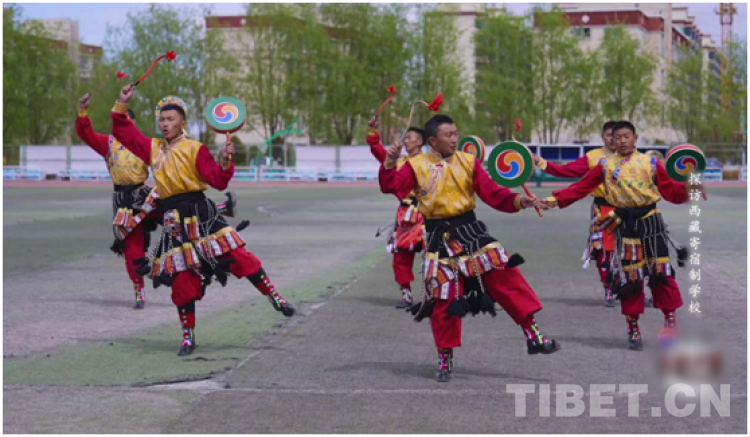
While students learn different subjects such as Chinese and English, the school still spare no effort to preserve the traditional Tibetan culture, giving children the key to broaden their horizons and give them the opportunity to explore a wider world. Isn't this the meaning of education? Where is "assimilation"?
Question 2. Are children forced to attend boarding schools?
A UN human rights report issued on February 6 said, “This increase in the number of boarding students in Tibet is achieved by the closure of rural schools in areas which tend to be populated by Tibetans, and their replacement by township or county-level schools which require children to board.”
What is the real situation? Are parents willing to send their children to boarding schools?
Angela decided to take a look at Nagqu, hundreds of kilometers away from Lhasa, with Ngodrup Tsomo, a student from Class Two of the Grade One of Lhasa-Nagqu No. 1 Senior High School.
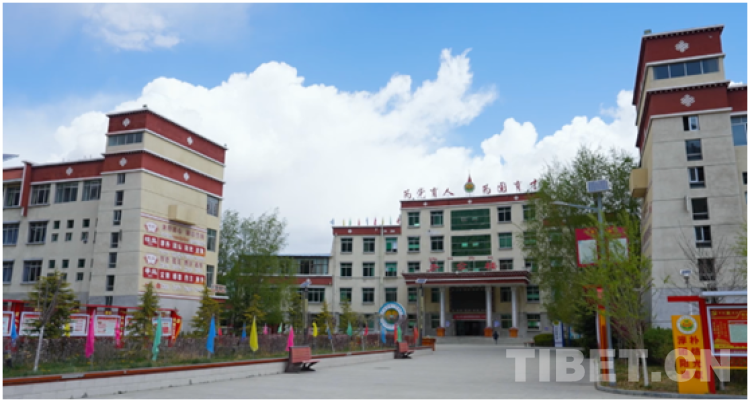
Located in the northern part of Tibet, Nagqu is more than 20 times the size of Beijing, but its population is only 2% of Beijing's, and it is scarcely populated.
Because it is located in the high cold, the oxygen content of Nagqu is only half that of sea level, and it is called "the closest place to the sky".
In the natural village where Ngodrup Tsomo grew up, all of 14 families herding for a living.
Ngodrup Tsomo attended boarding school in Lhasa, while her two younger sisters stayed with an aunt in the city to study. In Ngodrup Tsomo’s home, Angela talked with her father.
Angela: Your eldest daughter is now in high school. Did you know that this high school was a boarding school?
Ngodrup Tsomo 's father: When I registered for the first semester, I saw that the accommodation was very good and the campus environment was also very good. I am very satisfied with this school. I didn't go to school myself, which I find very regrettable when I look back.
Angela: Wasn't there a school nearby before?
Ngodup Tsomo 's father: There were schools in those places, but the conditions of the schools were not comparable to the facilities and equipment of the schools today. At that time, ordinary people's children went to school or not, depending on their own ideas. I chose to stay at home and graze, so I didn't go to school, and now I regret it.
According to Angela, in Ngodup Tsomo’s hometown, all around is surrounded by mountains and the population is unevenly distributed. So it would be hard to build schools in every place here. There are several reasons. Fisrt, not all of the teachers can really adapt to the conditions here. The second reason is the population distribution is uneven. So we can just imagine how many schools we need to build and how many teachers we need to provide for each school, which is difficult to realize. So this is why she thinks boarding schools appear.
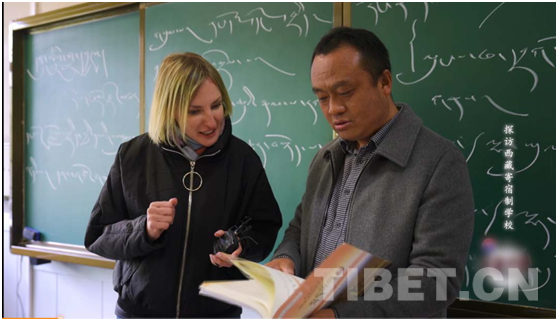
When returned to Lhasa-Nagqu No. 1 Senior High School in Lhasa, Angela had a talk with Sonam Tsering, Vice President Lhasa-Nagqu No. 1 Senior High School.
Sonam Tsering: Our school is open to the whole region, not only students from Nagqu, but also students from Lhasa, Shigatse and Ngari, all of whom are covered by food, housing and study. The three-guarantee funds allocated by the state to our school have reached about 11,445,700 yuan per year.
Angela: So the biggest expense is to hire a teacher? Or what?
SonamTsering: No, spent on hiring teachers is not allowed. All the funds allocated by the state for the three guarantees must be used for students.